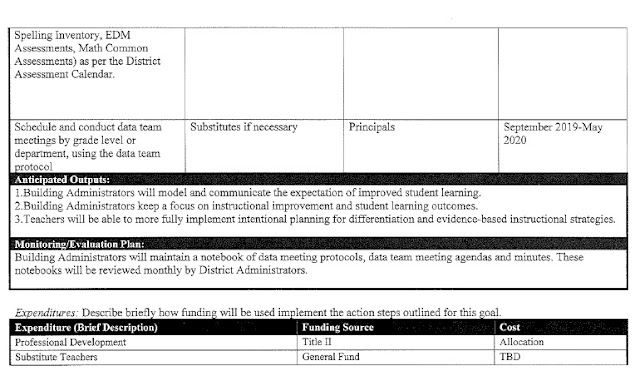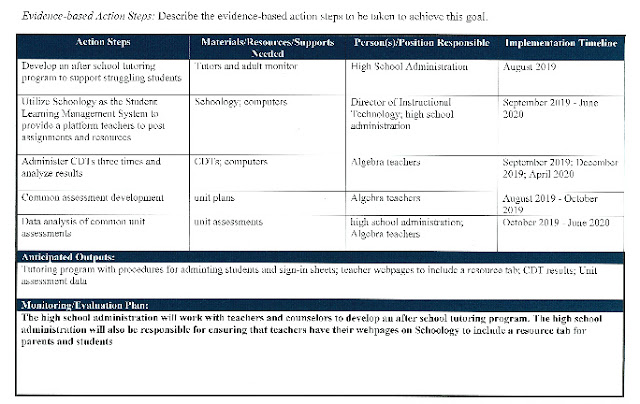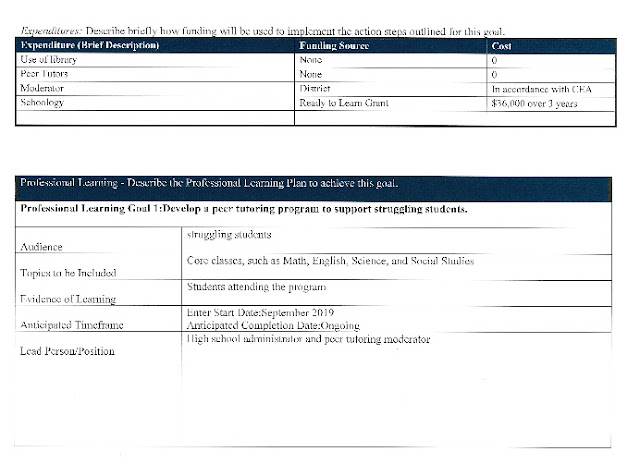As CAP leaders, we often receive outreach from community members, parents, teachers, principals, and students. A recent Instagram post asked students how well CASD prepared them for college and prompted a number of responses. One student's initial response then led to her submission of her personal testimony, which we feel presents a call to action among the most powerful we've read. Her career in the school district began under former leadership and presented her with several challenges to overcome. As you read her story, you'll see that while various efforts were made to help her, these supports were not sufficient or appropriate to her needs. But as the district changed to new leadership, instead of things getting better, even those supports were removed. She was repeatedly placed into classes that were not a good fit or using curriculum that did not help her learn. And despite her failure to make meaningful progress over the past five years, she graduated with her class and now is not prepared for the college education she is seeking. We must fix this for future students, and we must appreciate the bravery it took for this student to share her experience, and honor her by not letting this continue.
I would like to tell you all about my experience in the Coatesville Area School district. I am a class of 2019 graduate and I can honestly say I feel as though the district has failed me as student. Let’s starts with elementary school. I attended Caln Elementary. My struggles for math started when I was in 2nd grade. My mind did not comprehend what was being taught the way everyone else’s did. Third through fifth grade I was offered two different support groups. Two or three times a week myself and a few others were pulled from class and taken for extra help. I was also placed in a before school program twice a week where I was given even more help. One thing I noticed about these groups was that majority of the other kids were pulled out of class from time to time to work with a different teacher who could provide them a smaller classroom with even more help. Looking back now, I know it was the special education classroom or something of the sorts. Why not me? Why was I never recommended for that service when the school was well aware of my constant struggling? They passed me onto middle school where things got even worse for me.
My first year at Scott Middle school I started seeing a therapist/behavioral specialist that was provided by child guidance who happened to help a lot of kids throughout the district. I met with my specialist twice a week at the school . She was aware of my battle with math. She suggested to my guidance counselor multiple times that I could possibly have a learning disability and could possibly benefit from an evaluation leading to an IEP. Her concerns were ignored and blamed on my behavior. My mom also reached out more than once trying to find help for me. She was also ignored. Year after year I was pushed along. I can honestly say that I have not solved a single math problem outside of basic math since 8th grade. Third grade is the year most kids are taught long division. Not me. I was never taught. As I got older teachers just assumed I've learned it when everyone did so they never took the time to teach me how to solve long division problems. This never affected me until I got to middle school. Still to this day I do not have any idea how to solve a long division problem. Middle school was the last time I ever sat in a traditionally TAUGHT math class and even then I struggled but I managed to get by.
Starting my freshman year CPM was the new thing. With my already basic math skills this pushed me even further behind. We were forced into groups of 4 or more and told to “teach each other”. There was no direct instruction and no help offered outside of the group you were placed in. I became so far behind in math that I had given up on it entirely. I eventually stopped going to class. I asked administration to switch me to a different class to see if that was any better. They ignored my requests all year then finally decided 2 weeks before the year ended to switch me?? What good was that? The year was over. My 10th grade year I attended the cyber academy and was placed in 2 math classes at once. That year out of both math classes I did not solve one single problem on my own. Every correct answer I had was given to me by the Cyber staff. As much as they tried to teach me they really just didn’t have the resources nor the time. Why should they be expected to teach what my previous teachers failed to do?? My 11th grade year like everyone else I did what I had to do, I cheated my way through. My 12th grade year I was placed in Math for life which was NOT CPM. Although math for life is basic math for the first time in years I thrived. I understood everything. I 110% believe the reason I had such success was because it was a traditional taught class. I also had Mr. Dougherty who is an outstanding teacher. My question is would he still be so outstanding at what he does if he was teaching CPM? A curriculum that he is uncomfortable teaching? CPM is uncomfortable for the staff and students. Why should our teachers have to teach in a way they aren’t comfortable with? Or have to deal with all of the frustrated students? They should have a say. WE should have a say.
I would also like to you tell you about another challenge I faced during my 12th grade year. English has never been an issue for me, in fact it was always one of my better subjects. I was placed in 12th grade Honors English. This was my first year ever taking honors English. I was very nervous going into this class because all I've ever known was academic level where you are LITERALLY babied by the teachers. Babied was what I was familiar with. I went to guidance the very first week of school trying to switch back to academic but was denied the chance. Now I will say I had a very close relationship with my guidance counselor and she used lots of tough love on me and pushed me to my full potential always. So in no way do I hold her responsible for this terrible experience.
I decided to try the class out for a few weeks because who knows maybe I would be okay in there. I was not. I Failed marking period after marking period .. I begged ALL of the administrators to switch me out of there. I went to the office multiple times a week every week for months pleading with them. Nobody helped me. They sat and watched me fail over and over again. My teacher agreed that the class was a bit too challenging for me. My mom also reached out to see why nothing was being done. Someone should have stepped in. I was told repeatedly that the reason for not switching me was “you aren’t gonna like every teacher you get”. This angered me the most because I actually loved the teacher, I thought she was great at what she does and genuinely cared about each and every one of us. In fact when I would ask to switch I asked to be in HER academic class. Coming from academic level you don’t get the chance to properly learn how to write a paper, or an outline on your own. In my overcrowded honors class of 30+ kids I was too ashamed to tell my teacher I had no idea how to do what everyone else was doing. The class was very fast paced and I truly felt like my mind didn’t operate the same as everyone else’s. The work became too much at once for me. I couldn’t keep up and no late work was accepted. Coming from academic I was no way prepared for this type of environment. It was a terrible experience for me and I wish that someone would of stepped in to help me out. I spent my entire senior year worrying that I wasn’t gonna graduate because of English. I received help here and there from my guidance counselor as well as a few other teachers and for that I’m thankful. However, it just wasn’t enough. How can you force a student into an honors class when you know they don’t belong? They will switch an elective in a heartbeat but not the classes that matter. In all honesty, I should have not graduated with my class. I did not earn my passing grade fairly. I was lucky enough to have a teacher that was willing to work with me and allowed me to make up 2 big projects from earlier on in the year that I did poorly on. What if I wasn’t so lucky? I would have failed my senior year.
Being a Red Raider for the past 13 years has been an experience like no other, I loved every second of it but wish a lot of things were done differently. It wasn’t until after graduation that I realized just how bad Coatesville really does fail some of us. Passing us from grade to grade and class to class when we aren’t ready only fails us in real life. I am now struggling with finding a college that will accept me. I have also had to limit myself on what I can major in because I never learned a lot of the basic skills needed, especially in math. My search for a college major doesn’t come down to what I’m passionate about anymore... it comes down to what major can I choose that has just enough basic math that I can make it through. And I can tell you... the answer is not many. It is unfair to me that I was not properly prepared for college. It is unfair to me that I am almost positive I have a learning disability in math but everyone from elementary to high school ignored the signs. They don’t seem to care about our futures, they care more about making sure it looks good on paper when we all pass and graduate. The higher-ups standing before the graduating class and saying that we’ve all completed the requirements is far from the truth when I know the truth is that they pushed many of us along just to get us out the door. And because they’ve done that... my next door is limited. And it’s the most important one.
Written By a 2019 Coateville Graduate








